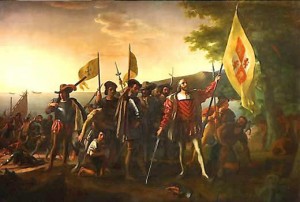 We have put aside naive notions of Christopher Columbus as the heroic discoverer of the New World, but on Columbus Day and in general we should continue to contemplate the troubling bases and ramifications of Columbus’ voyages.
We have put aside naive notions of Christopher Columbus as the heroic discoverer of the New World, but on Columbus Day and in general we should continue to contemplate the troubling bases and ramifications of Columbus’ voyages.
Columbus’ voyage in 1492 rested on his contractual agreement with the King and Queen of Spain. In return for spices and especially the gold he anticipated finding, Columbus received financing for three small ships and a combined crew of 40 and also promises of ten percent of all profits, the lucrative governorship of any new-found lands, and the title “Admiral of the Ocean Sea.” Columbus returned from his first voyages with a few spices, gold he had plucked from native peoples’ ear lobes, and 350 newly enslaved men and women. (An additional 250 had died on the sail back to Spain.) The King and Queen were impressed enough to finance a second expedition in 1493 of seventeen ships with 1200 men–including a full cavalry troop and a half-dozen priests. The fleet raided and plundered the Caribbean islands and was followed by subsequent large expeditions under Columbus’ command in 1498 and 1502.
The indigenous peoples of the Caribbean paid the heaviest price for these ventures.
Scholars estimate that Hispaniola, where Columbus maintained his home base, had a population of eight million in 1492. Extraordinary numbers died of European diseases. Thousands more were executed by Columbus and his men when they failed to produce the gold thought to be hidden on the islands. Still others were enslaved and died working the large estates, later known as “encomenda.” Some Arawak Indians committed mass suicide with cassava poison, and others killed their children to “save” them from the Spaniards. By 1496, the population had dropped to four million, and by 1508 the number was down to 100,000. By 1535, the native population was for all purposes extinct. To quote the historian David E. Stannard, “Among all the horrific genocides of the twentieth century against Armenians, Jews, Gypsies, Ibos, Bengalis, Timorese, Ugandans and more, none came close to destroying this many people and this large a percentage of a population.”
It is of course much too late to prosecute Columbus for crimes against humanity, but time remains to reflect on the human cost of various western cultures’ drive for personal and collective profit, sense of cultural and religious superiority, and assumption that the earth is theirs to control and exploit. Even in the present, we can benefit from recognizing the monstrous developments such ideologies and cultural attitudes can cause.

To think we celebrate this man as the person who discovered America. Thank you for this honest look at a man responsible for more deaths then many other horrific men of our past. I initially wrote the names of the horrific people but I did not want to receive any hate mail in my inbox.
It is also worth remembering that the Spanish themselves eventually concluded that Columbus was a sadistic tyrant. In 1500, Francisco de Bobadilla, appointed as Commissioner of the new Spanish colonies by the Spanish Court, arrived in Santa Domingo. Bobadilla was stunned by the level of complaints about the excessive atrocities committed by Columbus and his two brothers. The complaints were voiced, not by native Americans, but by the Spanish who served under Columbus.
Bobadilla was so outraged that he had Columbus arrested and placed in chains. He was held in prison in Santo Domingo until the fall when he was sent back to Spain to be tried, still in chains.
At his trial, 23 witnesses testified that Columbus regularly used acts of torture to govern. He spent several weeks in prison in Spain before he was freed by his patron, King Ferdinand. Although Columbus was eventually authorized to make a fourth voyage to the new world, his title of Governor was never restored.
What I find most amazing is that nineteenth century Protestant Americans embraced this Papist tyrant and converted him into something of a Daniel Boone in a boat, allowing him in public memory to stand on the deck, facing west and encouraging his faithless crew to “Sail On.”
Leif Ericson and his Norse crew would have made a much better group of founding fathers.
Pingback: Manifest Destruction | Fluxion